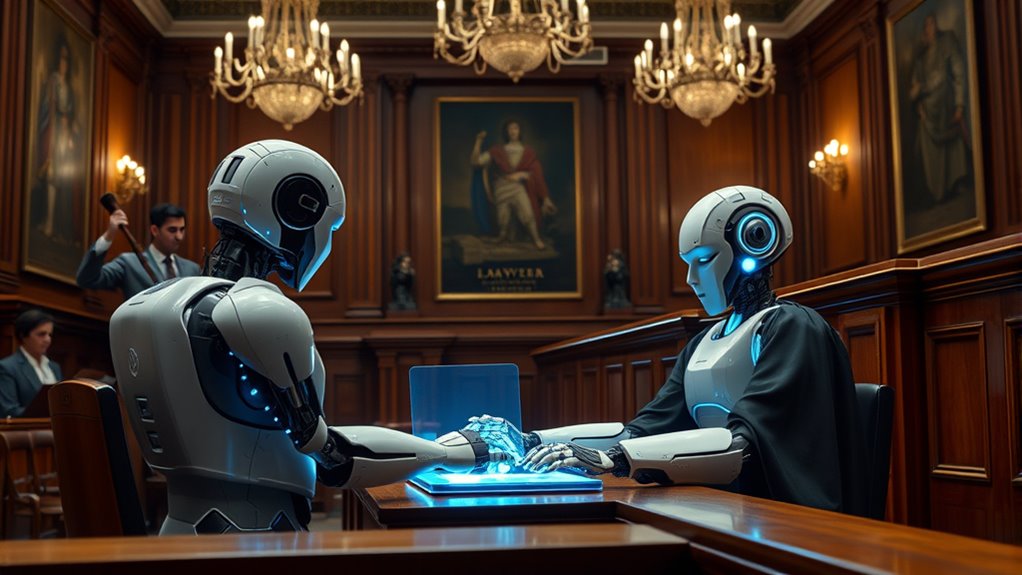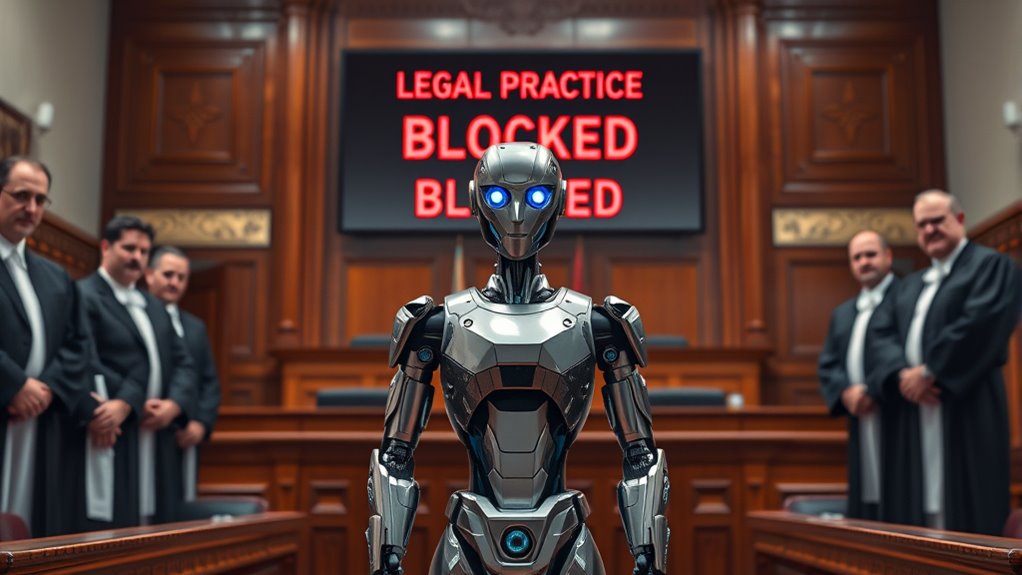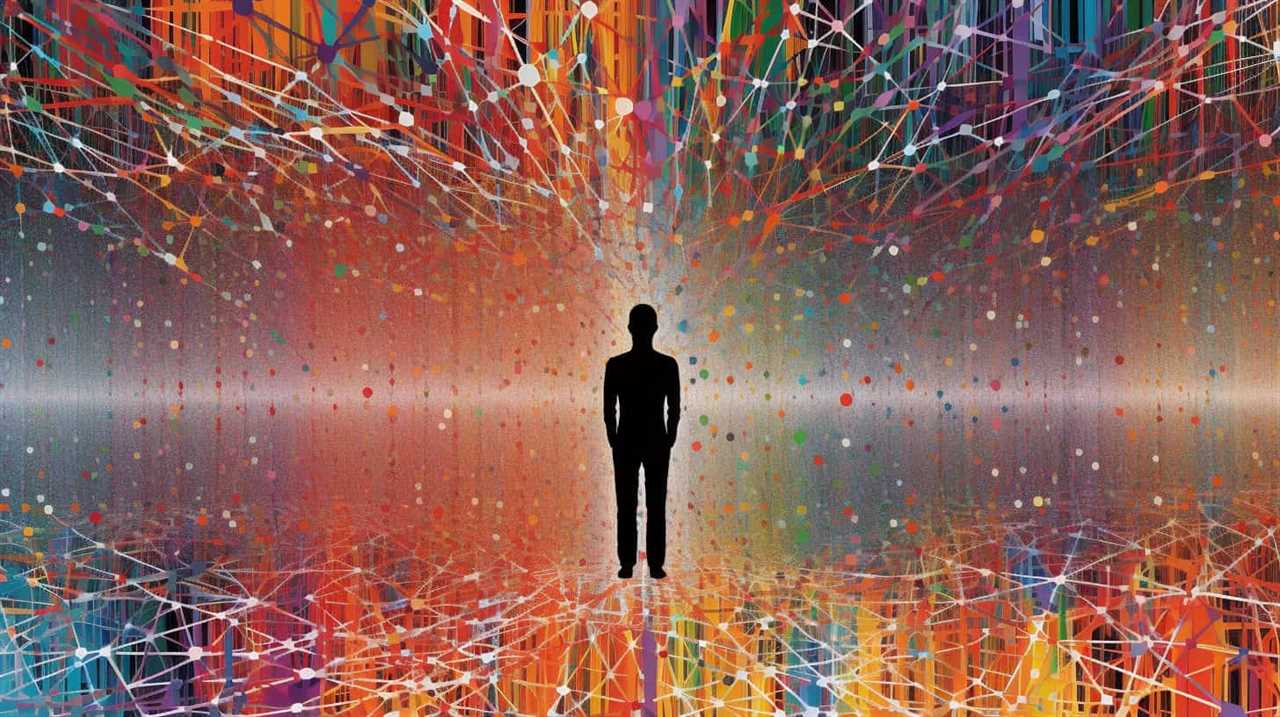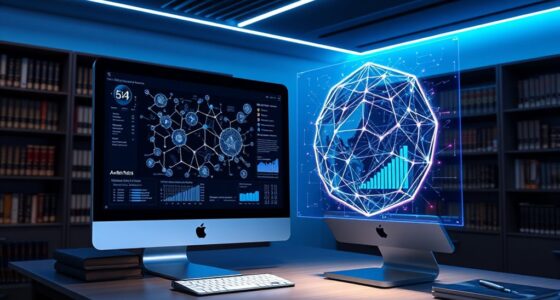The court has officially barred a “robot lawyer” from practicing law without a license, citing risks to clients and the justice system. They highlight concerns about AI providing unregulated legal advice, which can lead to errors, bias, or harm. The decision emphasizes the importance of human oversight, accountability, and ethical standards in legal practice. If you want to understand how this could impact future legal services, there’s more to explore.
Key Takeaways
- The court officially bans unlicensed AI legal tools to protect clients and ensure legal services are supervised by licensed professionals.
- Concerns about AI providing biased, incorrect, or unregulated legal advice prompted the court’s decision.
- The ruling emphasizes the importance of human oversight, transparency, and accountability in legal practice.
- AI systems lack moral judgment and legal responsibility, creating liability and ethical issues without proper licensing.
- The decision highlights the need for responsible AI integration and regulation to prevent misuse and protect the justice system.

A court has officially barred a so-called “robot lawyer” from practicing law without a license, highlighting ongoing concerns about the use of artificial intelligence in legal services. As someone interested in the intersection of technology and law, you need to understand why this decision matters. The core issue revolves around AI ethics and legal liability, which are critical when deploying automated legal tools. AI ethics demand that these systems operate transparently, fairly, and responsibly. Without clear oversight, there’s a risk that AI-driven legal services could produce biased or incorrect advice, potentially harming clients and undermining trust in the justice system. The court’s move underscores the importance of human oversight in legal practice, especially when AI is involved.
A court bans unlicensed AI legal services to ensure transparency, accountability, and human oversight in legal practice.
Legal liability is another central concern. If an AI makes a mistake—say, giving incorrect legal advice or misinterpreting case law—the question arises: who is responsible? Unlike licensed attorneys, AI systems don’t carry professional accountability, which complicates the legal landscape. When harmful errors occur, the person or entity behind the AI could be held liable, but currently, many jurisdictions lack clear regulations defining this responsibility. The court’s decision acts as a warning that deploying AI tools in legal settings without proper licensing and oversight risks legal repercussions and damages to clients. You should recognize that, for now, using AI as a substitute for licensed legal professionals remains fraught with legal and ethical pitfalls.
This ruling serves as a reminder that automation can’t replace the nuanced judgment of trained lawyers. While AI can assist with research or document review, relying solely on a robot lawyer for client representation crosses ethical boundaries. You need to be aware that AI systems lack the moral reasoning and contextual understanding that human lawyers bring to legal disputes. Without a license, these systems operate outside the bounds of professional standards, risking misuse and harm. The court’s action emphasizes that legal services are inherently serious and must abide by strict ethical standards, including accountability and transparency.
Ultimately, this case highlights the ongoing debate about integrating AI into legal practice responsibly. You should appreciate that advancements in AI hold promise, but they also demand careful regulation to ensure AI ethics are upheld and legal liability is clearly assigned. Until those frameworks are in place, courts are likely to intervene whenever AI tools threaten to bypass licensing requirements or compromise legal standards. For now, the message is clear: AI can support legal work, but it can’t—and shouldn’t—replace licensed professionals without proper oversight and regulation.
Frequently Asked Questions
How Does the Robot Lawyer Operate Without a License?
You might wonder how a robot lawyer operates without a license. It likely uses automation ethics principles to provide legal info and document automation, but it doesn’t replace licensed attorneys. Licensing challenges prevent it from offering full legal services, so it functions more like a legal tool or advisor. This approach helps users access basic legal guidance while avoiding the risks associated with unlicensed practice.
What Specific Risks Are Associated With AI Legal Services?
You face risks like privacy concerns and accountability issues with AI legal services. While AI can process data quickly, it may mishandle sensitive information, putting your privacy at risk. If mistakes happen, who’s responsible? Unlike human lawyers, AI lacks accountability, making it hard to address errors or misconduct. This juxtaposition highlights that relying solely on robot lawyers can compromise your legal rights and trust, risking serious consequences.
Can Users Still Access AI Legal Tools Legally?
Yes, you can still access AI legal tools legally, but you need to be cautious. Make sure the tools comply with AI ethics standards and protect your data privacy. Look for reputable providers that prioritize transparency and security. While these tools can be helpful, remember they shouldn’t replace professional legal advice, especially when sensitive information or complex issues are involved. Staying informed helps you use AI legal services responsibly and legally.
Are There Any Legal Precedents for AI Practicing Law?
You should know that there are few legal precedents for AI practicing law, mainly because of concerns around legal ethics and AI accountability. Courts haven’t recognized AI as licensed practitioners, emphasizing that AI cannot uphold ethical standards or be held accountable. This means you must rely on licensed professionals for legal advice, as current laws prevent AI from independently practicing law without oversight, ensuring ethical standards are maintained.
What Alternatives Exist for Individuals Needing Legal Representation?
If you need legal representation, you can turn to licensed attorneys who follow legal ethics and are accountable for their advice. While AI tools can assist with research or document review, they shouldn’t replace qualified lawyers. Be cautious of AI’s limitations and potential risks. Always verify that your legal professional upholds ethical standards and ensures accountability, protecting you from legal pitfalls and ensuring your rights are properly defended.
Conclusion
Imagine trusting a machine to navigate your most important legal decisions, only to realize it’s like handing your future to a reckless driver. The court’s ruling reminds you that technology, no matter how advanced, can’t replace the human judgment and expertise needed in law. Just as you wouldn’t let a robot perform surgery without proper training, you shouldn’t rely on unlicensed AI lawyers. Protect yourself by ensuring your legal help is qualified and licensed.










